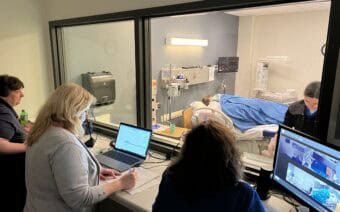October 19, 2022
NORTHEAST WISCONSIN – It’s no secret that the road to leadership for women has historically included more barriers than their male counterparts.
According to Fortune.com, of the world’s top 500 companies, just 44 of them are led by women, which is about 8.8%.
And though women comprise more than half of the workforce, they make up just a little more than a third of the upper leadership positions, according to the job and career-insight site Zippia.
Much has changed over the years, and the number of women in leadership positions continues to rise, however, many say there is still a long way to go.
Those same people are doing what they can to encourage and empower women through conferences, initiatives and professional development opportunities.
“The world needs more women leaders,” Vicki Updike, leadership coach and president of New Sage Strategies, said. “The more diversity there is at the leadership table, the more profitable and successful those companies are. The research has shown it time and time again, so it’s not just a ‘kind’ thing. This is smart for business.”
Updike recently hosted the 2022 Women’s Leadership Conference at the KI Convention Center in Green Bay, with the theme – “Be Bold. Be You.”
She said the annual conference gives women in business a chance to network and be inspired to advance their careers.
“Every year, I’m thrilled to see how this conference continues to grow and positively impact hundreds of women in business, not only in Northeast Wisconsin but around the country,” Updike said.
She said having self-doubt or a lack of confidence isn’t an uncommon issue.
Denise Thomas — president and owner of The Effective Communication Coach and one of the keynote speakers at the conference — said women have been conditioned to feel that “we need validation from others before we can truly call ourselves successful.”
 Women’s Leadership Conference keynote speaker Denise Thomas said women already possess all that is needed to be successful. Heather Graves Photo
Women’s Leadership Conference keynote speaker Denise Thomas said women already possess all that is needed to be successful. Heather Graves Photo
Thomas told the crowd of women professionals they already have the necessary validation within themselves, but it is up to them to “live with your power.”
“My dear sisters, we already have it, but for some reason, we were conditioned to believe that somebody else has to validate it before we can operate with it,” she said. “Everyone in this room has a power. Do you know your power? Even when those roadblocks occur, even when there’s a miscommunication, you have to operate with power. Stop wasting your time explaining yourself to people who are committed to misunderstanding you.”
The Institute for Women’s Leadership at the University of Wisconsin-Green Bay focuses on being that support for women throughout Northeast Wisconsin.
Executive Director Janet Bonkowski said the mission of the institute is to advance women, both personally and professionally, at all stages of their careers by educating, inspiring and providing networking opportunities to create a strong and equitable workforce.
Bonkowski said the institute aims to build a pipeline of female leaders.
“While we know organizations with more women leaders are more profitable, there’s a disconnect in the relatively low number of women who have been able to advance to serve in leadership roles at an executive or C-suite level,” she said.
Dean Stewart is the director of St. Norbert College’s Center for Excellence in Leadership (CEL), which helps companies develop their most talented employees into their next top leaders.
He said CEL was started five years ago by a group of 17 companies because they were finding many employees who otherwise might be headed for leadership roles had little leadership experience.
Stewart said CEL runs seven, 16-month leadership programs per year, including two cohorts per year for C-suite leaders, two cohorts per year for senior managers and three programs per year for new and emerging leaders.
He said more than half of the students in CEL classes are women.
In addition, CEL hosts a nonprofit leadership forum, featuring 40 nonprofits from the region.
“Ninety percent of those participants are women,” Stewart said.
In a 2021 study by McKinsey & Co., Stewart said women were found to be more successful when it comes to helping their employees and supporting them emotionally.
In addition, it found that women are more conscientious about employee burnout and work-life balance than their male counterparts.
The study also found that when employees feel cared for and supported, they’re happier with their jobs and less likely to leave them.
“If you think about that in terms of today’s environment, with people leaving jobs at record rates, or quitting jobs at record rates, a lot of that can be traced back to well-being,” Stewart said.
Burn out
A few months ago, the UWGB Women’s Leadership Institute conducted a similar job and life satisfaction survey, which Bonkowski said found that women in the New North region are burned out.
And never has that burnout been more visible than during the worst of the COVID-19 pandemic when many women had to pivot by either scaling back their careers to care for their kids or attempting to walk the balance beam of remote work while their kids did online learning in the next room.
Of the more than 800 women who took the Institute for Women’s Leadership survey, Bonkowski said 30% held senior management or higher positions, 45% had children at home and 20% were taking care of their parents.
Additional findings found:
48% felt they had experienced a lack of opportunity.49% said they felt burned out in their jobs.49% said their workplace had a work-comes-first mentality38% said they felt overwhelmed.28% felt they had experienced gender discrimination.21% felt they had experienced verbal harassment.43% said most of the childcare duties fell to them.
Colleen Hauk – the CEO of The Corporate Refinery, a consulting and training firm aimed at forging new paradigms for women and what leadership means for today’s world and breakout speaker at the Women’s Leadership Conference – said it shouldn’t have to be an either-or, but an “and.”
“Unfortunately, burnout has become a household term in the past couple of years,” she said. “In fact, Deloitte’s Women @ Work 2022 report showed that even for women who have not left their organizations that are actively considering it, nearly 40% of that cited burnout as the reason why.”
In her session, Hauk focused on what she called the “and” life.
She said the World Health Organization said one can identify burnout across three dimensions:
You’re feeling depleted or exhausted.Being mentally distant from your job or having negative feelings or cynicism.Reduced professional efficacy.
“Don’t try to achieve perfect balance, but acknowledge when you’re mentally fatigued,” Hauk said.
 Denise Thomas, right, said women leaders need to advocate for themselves, advocate for others and stop expecting themselves from others. Submitted Photo
Denise Thomas, right, said women leaders need to advocate for themselves, advocate for others and stop expecting themselves from others. Submitted Photo
Bridget O’Connor, owner of O’Connor Connective in De Pere, said family needs and work needs will always be at odds – stressing the importance of creating and supporting a balanced workplace.
“When in one place, we worry about the other,” she said. “It’s a challenge women talk about everywhere I go. The more we can craft family-friendly workplaces, the better chance we have at finding happiness in our personal and professional lives.”
O’Connor said movement in that direction — for both women and men — needs to start at the top of an organization.
Advocating for each other
Karen Lemke said before she opened her business, Lemke Leadership of Appleton, she worked for several multinational corporations, where she said she sometimes found herself outnumbered.
“I was the only woman on a couple of different executive leadership teams,” she said. “It would have been nice to have some mentoring, at that time, from someone who could relate to my experiences.”
Updike said sometimes it can be lonely at the top.
“A lot of times, executives and leaders feel alone and don’t have a dialogue partner to talk about what their concerns are or what they may be struggling with,” she said.
Lemke spoke at last year’s Women’s Leadership Conference and said she ended up gaining more than she gave by meeting others who shared similar struggles and successes.
“I learned many mindsets and practical behaviors I could implement right away,” Lemke said.
Thomas described these as advocates.
“Allies are nice to have,” she said. “What I want each of you to think about is making sure that you have advocates. As women leaders, we have to be the pillars of advocating for ourselves, advocate for others and stop expecting ourselves from others.”
 ‘It’s time for the building to have a fresh look’
‘It’s time for the building to have a fresh look’ Creating spaces where people can unwind, appreciate world around them
Creating spaces where people can unwind, appreciate world around them








